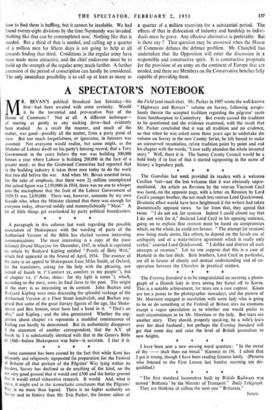A paragraph in this column last week regarding the possible
association of Shakespeare with the wording of parts of the Authorised Version of the Bible has elicited various interesting communications. The most interesting is a copy of the (now defunct) Strand Magazine for December, 1947, in which is reprinted an article by Rudyard Kipling entitled "Proofs of Holy Writ," which first appeared in the Strand of April, 1934. The essence of the story is an appeal to Shakespeare from Miles Smith, of Oxford, for the translators, asking for his help with the phrasing, not indeed of Isaiah xi_ ("Comfort ye, comfort ye my people "), but of chapter ix. (" Arise, shine: for thy light is come "), which, according to the story, owes its final form to the poet. The origin of the story is as interesting as its content. John Buchan and Rudyard Kipling were once discussing the splendid verbiage of the Authorised Version at a Fleet Street lunch-club, and Buchan sug- gested that some of the great literary figures of the age, like Shake- speare and Ben Jonson, must have had a hand in it. " That's an idea," said Kipling ; and the idea germinated. Whether the sug- gestion about chapter Lx represents a muddled reminiscence of Kipling can hardly be determined. But its authenticity disappears If the statement of another correspondent, that the A.V. of Isaiah xt., I is substantially identical with that in the Geneva Bible Of 1560—before Shakespeare was born—is accurate. I fear it is.
* * * *


































 Previous page
Previous page